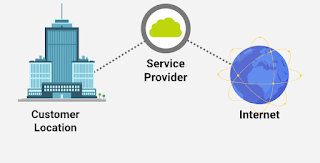Choosing the right connection for your business in the realm of business connectivity, choosing between Ethernet dedicated lines and wireless networks involves careful consideration of factors such as reliability, speed, security, and cost-effectiveness. Each option has its strengths and weaknesses, making them suitable for different business needs and environments. This article explores the key differences between Ethernet dedicated lines and wireless networks to help businesses make informed decisions about their connectivity solutions.
Understanding Ethernet Dedicated Lines
Ethernet dedicated lines, also known as leased lines or dedicated internet access (DIA), provide a direct, private connection between your business premises and the service provider's network. Here are some characteristics and advantages of Ethernet dedicated lines:
- Reliability: One of the primary advantages of Ethernet dedicated lines is their reliability. These connections typically come with service level agreements (SLAs) that guarantee uptime and performance metrics such as latency and jitter. This makes them ideal for businesses that rely heavily on consistent internet access for critical operations.
- Performance: Ethernet dedicated lines offer symmetrical speeds, meaning upload and download speeds are equal. This is crucial for businesses that frequently transfer large amounts of data, use VoIP services, or rely on cloud applications where consistent bandwidth is essential.
- Security: Because Ethernet dedicated lines are dedicated to a single business, they offer inherent security advantages over shared internet connections. Data transmitted over these lines is less susceptible to interception or security breaches compared to wireless networks or shared internet connections.
- Scalability: Ethernet dedicated lines can usually be scaled according to business needs. Whether you need to increase bandwidth or connect multiple locations, providers can often accommodate these changes quickly and efficiently.
- Cost: While Ethernet dedicated lines offer significant benefits, they are generally more expensive than alternative connectivity options like broadband or wireless. The cost can vary depending on factors such as location, required bandwidth, and contract terms.
Advantages and Considerations of Wireless Networks
Wireless networks, on the other hand, utilize radio waves to transmit data between devices and access points. Here’s a look at their key characteristics and considerations:
- Flexibility and Mobility: Wireless networks provide unmatched flexibility and mobility. They allow employees to connect to the network from virtually anywhere within the coverage area, making them ideal for businesses with dynamic work environments or remote teams.
- Ease of Deployment: Setting up a wireless network is generally quicker and more cost-effective than installing Ethernet lines, especially in environments where wiring is challenging or impractical.
- Cost-Effectiveness: Wireless networks can be more cost-effective for smaller businesses or startups that don't require the high bandwidth and guaranteed uptime of Ethernet dedicated lines. Initial setup costs are typically lower, and there may be less ongoing maintenance compared to dedicated lines.
- Scalability: Wireless networks can easily scale to accommodate additional devices or expanded coverage areas. This scalability makes them suitable for growing businesses or environments where flexibility is paramount.
- Speed and Performance: While wireless technology has advanced significantly, it still generally lags behind Ethernet in terms of raw speed and reliability. Factors such as interference, distance from access points, and network congestion can impact performance.
- Security Concerns: Wireless networks are more susceptible to security threats such as unauthorized access (Wi-Fi hacking) and interception of data transmissions. Implementing robust security measures such as WPA3 encryption and regular network monitoring is crucial to mitigate these risks.
Choosing Between Ethernet Dedicated Lines and Wireless Networks
When deciding between Ethernet dedicated lines and wireless networks, businesses should assess their specific needs and priorities:
- Critical Applications: If your business relies heavily on applications that demand high uptime, symmetrical speeds, and stringent security (such as financial transactions or data-intensive operations), Ethernet dedicated lines may be the preferred choice.
- Mobility and Flexibility: For businesses where mobility and flexibility are paramount, such as retail environments, coworking spaces, or businesses with a significant number of remote workers, wireless networks offer the necessary agility and convenience.
- Budget Considerations: Consider your budget constraints and the total cost of ownership. While Ethernet dedicated lines may have higher upfront costs, they offer predictable monthly expenses and reliability that can justify the investment for certain businesses.
- Security Needs: Evaluate your security requirements and the sensitivity of the data transmitted over the network. If data security is a top concern, Ethernet dedicated lines may provide peace of mind with their dedicated, less vulnerable nature.
- Future Growth: Think about scalability and future-proofing your network infrastructure. Ethernet dedicated lines are easier to scale in terms of bandwidth and capacity, making them suitable for businesses anticipating growth or needing to support increasing data demands.
In conclusion, both Ethernet dedicated lines and wireless networks have distinct advantages and considerations that make them suitable for different business scenarios. The choice ultimately depends on factors such as reliability, performance requirements, security concerns, budget constraints, and the need for mobility and flexibility. Businesses should carefully evaluate these factors and possibly consult with network specialists or service providers to determine the best connectivity solution that aligns with their specific needs and long-term goals. By making an informed decision, businesses can ensure they have a robust and efficient network infrastructure to support their operations effectively.


إرسال تعليق